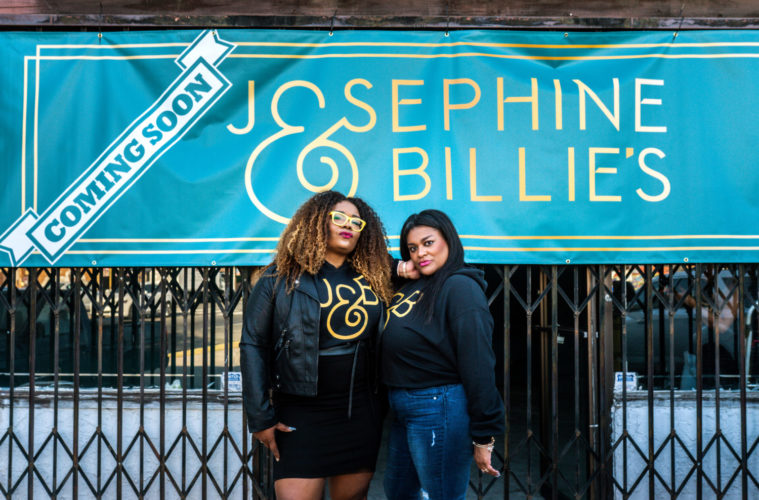Josephine and Billie’s, an L.A.-based cannabis speakeasy created by women of color for women of color, announced its brand launch in partnership with TPCO Holding Co. aka “The Parent Company.”
It’s the first big play for the new social equity fund led by Jay-Z as Chief Visionary Officer.
Josephine and Billie’s Founder and CEO Whitney Beatty and Ebony Andersen, Co-Founder and COO, joined us to talk about the big day for the company looking to create a sense of cannabis and community they feel women of color have been lacking in the modern cannabis age.
We started by asking what it meant to receive the first investment from a fund aiming to create an inclusive and equitable society and a legal cannabis industry. Especially in regard to providing support for Black and minority entrepreneurs to get the biggest piece of the industry they can before the dust eventually settles.
“Super!” Beatty quickly replied to L.A. Weekly. “Landing a lead investor like this has not been a short process. It’s been a long process, but it is amazingly exciting. It’s exciting to have an investment. It’s incredibly difficult to get investment in this space, and not to mention as Black females in the space in particular, and to have not just the money come in but to have the support and the resources of TPCO is not just incredibly exciting, it’s also validating for the work that we have done thus far. They’re building out what we think is a community for an underserved market in the cannabis space.”
Andersen also touched on that feeling of having their work validated.
“I have spent so much time developing the brand, but also our mission and who and what Josephine and Billie’s will serve, and how will we build this community,” Andersen
said. “To have a company like TPCO validate that and say, ‘yes you are on the right track.’ It really is phenomenal.”
Beatty went on to explain the idea TPCO was sold on.
“You know we seek to build a community for women of color in cannabis, and our allies,” Beatty said. “So obviously everyone is welcome. The idea is called Josephine and Billie’s because it’s named after Josephine Baker and Billie Holiday. Two women of color targeted for their cannabis use. Their careers were damaged, and I believe that in this climate now, it’s a great time for us to be able to pay homage to those people in the past who had to pay a heavy price for cannabis consumption.”
The speakeasy format is meant to be reminiscent of the teapads of the 1920s and ‘30s. While African Americans were discriminated against at the white-run speakeasys that existed during the prohibition of alcohol, teapads in places like Harlem were locations they could consume cannabis, drink, have community and listen to music. “That’s the vibe that we’re trying to bring back with this location,” Beatty said.
We asked the pair how difficult it was to accomplish this in Los Angeles, where social equity licensing in cannabis has now been a hot topic issue for years. It’s been tough.
“I was in the first 100. I applied September 3rd. I was 46 on the list, paying rent since mid-2019, and I don’t sell weed yet. So there’s that,” Beatty noted.
Andersen is the licensing expert of the pair. She’d worked with some of L.A.’s earliest successful social equity applicants.
“As the person who is more of the licensing guru, I can say that I’m an urban planner. I do licensing. I write a lot of policies and regulations, so I know how to navigate them very well. And it’s been incredibly difficult,” Andersen said. “The LA DCR was tasked with something that was almost impossible to begin with, and they are kind of building the plane as they’re flying it. And so navigating and riding that, it’s been really challenging, and still being able to stay afloat and have the funding. A lot of the social equity applicants, as I’m sure you’ve heard a million times, don’t.”
As for having to compete against companies that are run by figureheads essentially claiming to be doing the same thing they are?
“It definitely makes it difficult when we don’t have access to capital. I mean, it’s one of the things,” Beatty said before speaking of the issue being a keystone of the work she’s done in the past with Supernova Women. “In the cannabis space, three, four years ago they were talking about how there are more female CEOs in cannabis than anywhere else. And what we’ve seen is that number plummet like a rock. I believe that one of the reasons we see that is because of the amount of VC money that’s pouring into this space.”
But these businesses with figureheads have the ability to raise money in a way that we’ve seen because they’re literally willing to give it all away for pennies on the dollar compared to equity applicants actually wanting to hold on to their equity.
“Traditionally, women have not been able to. I mean, women are getting 2% of these dollars, black women are getting point .0006% of VC dollars. How can we compete if someone else, if the white guy next door, is raising $5 million and I can only bring in $50,000? How am I going to compete fairly? It becomes almost impossible. One of the reasons this investment is so big for us is because it does allow us to compete in the market and to be able to bring our concept to fruition.”
Josephine and Billie’s is currently targeting a September opening.
Advertising disclosure: We may receive compensation for some of the links in our stories. Thank you for supporting LA Weekly and our advertisers.

